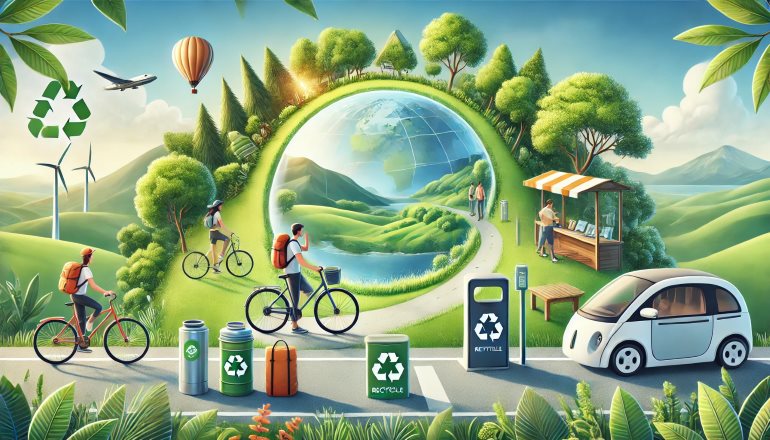The Ecotourism Paradox: Can We Explore Without Exploiting?
In an era of increasing environmental awareness and wanderlust, the concept of ecotourism has emerged as a beacon of hope for sustainable travel. It promises an enticing blend of adventure, cultural immersion, and environmental conservation. However, as the industry grows, so do the challenges and controversies surrounding it. This article delves into the complex world of ecotourism and tourism development, exploring the delicate balance between exploration and preservation.
Understanding Ecotourism
Before we dive into the challenges, let's define what we mean by ecotourism. The International Ecotourism Society defines it as "responsible travel to natural areas that conserves the environment, sustains the well-being of the local people, and involves interpretation and education." In essence, ecotourism aims to:
- Minimize negative impacts on the environment
- Build environmental and cultural awareness
- Provide positive experiences for both visitors and hosts
- Generate financial benefits for conservation
- Empower local people and communities
While these goals are admirable, achieving them in practice is far from simple.
The Promise and the Paradox
Ecotourism emerged as a solution to the destructive practices of mass tourism. It offered a way to satisfy our desire for travel while preserving the world's natural and cultural treasures. However, as the industry has grown, it has given rise to a paradox: the very act of promoting and facilitating visits to pristine environments and authentic cultures can lead to their degradation and commercialization.
Key Challenges in Ecotourism and Tourism Development
1. The Conservation Conundrum
The Challenge: How do we protect environments while allowing people to experience them?
Case Study: The Galápagos Islands, Ecuador
The Galápagos Islands face this dilemma daily. The islands' unique ecosystem, which inspired Charles Darwin's theory of evolution, attracts thousands of visitors each year. The revenue from tourism funds vital conservation efforts. However, the increasing number of visitors puts strain on the delicate ecosystem.
Increased foot traffic can lead to soil erosion and disturbance of wildlife habitats. The introduction of non-native species via tourist boats and planes poses a significant threat to the islands' biodiversity. Moreover, the growing demand for fresh water and energy to support tourism infrastructure adds pressure to the islands' limited resources.
Potential Solutions:
- Implementing strict visitor quotas and rotating visitation sites
- Enhancing biosecurity measures to prevent the introduction of invasive species
- Investing in renewable energy and water conservation technologies
- Educating visitors about their environmental impact and how to minimize it
2. The Local Economy Tightrope
The Challenge: How can tourism benefit local communities without creating over-dependency or economic disparity?
Case Study: Bali, Indonesia
Bali has experienced a tourism boom that has transformed its economy. While this has brought jobs and economic opportunities, it has also led to significant challenges. Many locals find themselves priced out of their own communities as land values soar. Traditional agricultural practices are being abandoned in favor of tourism-related jobs, leading to a loss of cultural heritage and food security.
Moreover, the economic benefits of tourism are not always distributed equitably. Large international hotel chains and tour operators often capture a significant portion of the revenue, while local communities may only receive a fraction of the benefits.
Potential Solutions:
- Implementing policies that ensure a fair distribution of tourism revenue
- Encouraging community-based tourism initiatives
- Supporting programs that help locals develop skills to participate in the tourism economy
- Promoting tourism models that integrate with, rather than replace, traditional livelihoods
3. The Authenticity Crisis
The Challenge: How can we share cultures without commodifying them?
Case Study: Hill Tribe Villages, Northern Thailand
In parts of Northern Thailand, hill tribe villages have become popular tourist attractions. While this has provided income for these communities, it has also led to concerns about cultural commodification. Some villages have been criticized for becoming more like "human zoos" than authentic cultural exchanges.
There's a fine line between sharing one's heritage and performing it for tourists' entertainment. This commercialization can lead to a loss of cultural authenticity and dignity for the local people.
Potential Solutions:
- Developing tourism models that prioritize genuine cultural exchange over spectacle
- Empowering local communities to have control over how their culture is presented
- Educating tourists about cultural sensitivity and appropriate behavior
- Limiting tourist numbers to prevent overwhelming local communities
4. The Carbon Footprint Quandary
The Challenge: How do we reconcile the environmental cost of travel with the benefits of ecotourism?
The irony is palpable - we're often burning significant fossil fuels to reach 'eco-friendly' destinations. Long-haul flights, in particular, contribute substantially to an individual's carbon footprint. This raises questions about the net environmental impact of ecotourism.
Potential Solutions:
- Promoting closer-to-home ecotourism opportunities
- Investing in carbon offset programs
- Developing and incentivizing more sustainable transportation options
- Encouraging longer stays to reduce frequent long-distance travel
5. The Overtourism Overflow
The Challenge: How do we manage visitor numbers without stifling the industry?
Case Studies: Machu Picchu, Peru and Venice, Italy
Machu Picchu now requires timed entries to manage crowds, while Venice is considering a tourist tax. As popular sites burst at the seams, the challenge is to balance access with preservation.
Overtourism can lead to environmental degradation, strain on local infrastructure, and a diminished experience for both tourists and residents.
Potential Solutions:
- Implementing visitor quotas and reservation systems
- Promoting alternative, less-visited destinations
- Using technology to manage tourist flows and prevent overcrowding
- Developing pricing strategies that reflect the true cost of tourism on local environments and communities
6. The Green-Washing Trap
The Challenge: How can travelers distinguish truly sustainable options from clever marketing?
With 'eco' labels slapped on everything from lodges to guided tours, it's becoming increasingly difficult for well-intentioned travelers to make truly sustainable choices. This proliferation of green-washing not only misleads consumers but also undermines the efforts of genuinely sustainable operators.
Potential Solutions:
- Developing and enforcing rigorous, standardized certification processes for ecotourism operations
- Educating consumers about what to look for in truly sustainable tourism options
- Encouraging transparency in tourism operations' environmental and social practices
- Supporting independent audits and reviews of ecotourism businesses
7. The Development Dilemma
The Challenge: How do we build necessary infrastructure without compromising natural beauty?
Infrastructure is necessary for tourism, but it often comes at the cost of the natural beauty people come to see. Roads, airports, hotels, and other facilities can significantly alter landscapes and ecosystems.
Potential Solutions:
- Prioritizing low-impact, sustainable building practices
- Integrating tourism infrastructure with natural surroundings
- Limiting development in the most sensitive areas
- Retrofitting existing structures rather than building new ones where possible
8. The Education vs. Exploitation Balance
The Challenge: Where's the line between education and interference in wildlife tourism?
Wildlife tours can foster conservation awareness, but they can also disrupt animal behavior. For instance, whale-watching tours can stress marine mammals, while safari vehicles can alter the hunting patterns of predators.
Potential Solutions:
- Developing and enforcing strict guidelines for wildlife viewing
- Educating tourists about responsible wildlife interaction
- Investing in technologies that allow for observation with minimal disturbance
- Balancing close encounters with opportunities for distance viewing and learning
The Path Forward: A Call for Collective Action
The challenges facing ecotourism and sustainable tourism development are complex, but they're not insurmountable. Progress requires a collective effort from all stakeholders in the tourism ecosystem:
- Travelers must educate themselves about the impacts of their choices and be willing to prioritize sustainability over convenience or cost.
- Tourism Operators need to commit to genuine sustainability practices, even when they might not be the most profitable short-term option.
- Local Communities should be empowered to have a say in tourism development and to benefit equitably from it.
- Governments must create and enforce regulations that protect environments and communities while fostering sustainable tourism growth.
- NGOs and Research Institutions can provide valuable insights and innovations to address the challenges of sustainable tourism.
- Technology Companies can develop tools to help manage tourist flows, reduce environmental impacts, and enhance educational experiences.
Conclusion: The Future of Ecotourism
As we navigate the complexities of ecotourism and tourism development, it's clear that there are no easy answers. However, by acknowledging and addressing these challenges head-on, we can work towards a future where tourism is a force for good - enriching the lives of travelers, supporting local communities, and protecting the natural and cultural wonders that make our world worth exploring.
The journey towards truly sustainable tourism will require creativity, commitment, and collaboration. But with the stakes being nothing less than the preservation of our planet's most precious places and cultures, it's a journey well worth taking.
As travellers, industry professionals, policymakers, or simply as global citizens, we all have a role to play in shaping the future of ecotourism. The question is: how will you contribute to making travel a force for positive change?



